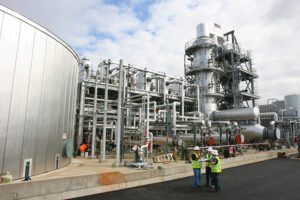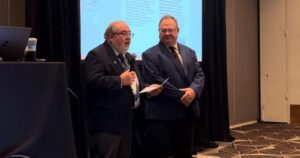Biodiesel and renewable diesel producers can help international shipping companies meet carbon reduction goals
WASHINGTON, DC – Today, Clean Fuels Alliance America and its members thanked Sens. Pete Ricketts (R-NE) and Sherrod Brown (D-OH) for introducing the bipartisan Renewable Fuel for Ocean-Going Vessels Act. The legislation designates renewable fuel used in ocean-going vessels as an “additional renewable fuel” (similar to jet fuel) under the Renewable Fuel Standard. This will enable biodiesel and renewable diesel producers to preserve Renewable Identification Number credits (RINs) in the RFS program, when the fuel is used in ocean-going shipping.
“This legislation will drive demand for biofuels and provide more opportunities for Nebraska farmers who have played a crucial role creating a strong renewable diesel economy,” stated Sen. Ricketts. “These kinds of solutions strengthen American energy independence, support American jobs, and reduce emissions.”
“Ohio can be a leader in producing more sustainable marine fuels – creating new markets for Ohio farmers,” said Sen. Brown. “From ships crossing the Atlantic to vessels delivering goods to ports along Lake Erie, Ohio soybean farmers can produce the renewable fuel of the future that drives this industry. This bill is a win for Ohio farmers and producers.”
Joining Clean Fuels in supporting the legislation are the Nebraska Soybean Association, the Ohio Soybean Association, the Illinois Soybean Association, the Michigan Soybean Association, the Indiana Soybean Alliance, and other groups seeking to increase use of low-carbon fuels and reduce carbon emissions in international shipping and travel.
“The international shipping industry is seeking to decarbonize and clean fuels like biodiesel and renewable diesel are available today to help,” said Kurt Kovarik, Vice President of Federal Affairs for Clean Fuels. “This commonsense legislation will enable biodiesel and renewable diesel producers to meet the low-carbon fuel demand from shipping companies operating on both coasts and the Great Lakes. It will open new markets to American clean fuel producers and their farmer partners.”
“Nebraska’s soy farmers have helped build a robust, rapidly growing biodiesel and renewable diesel industry. This legislation will open new market opportunities for Nebraska’s farmers and clean fuels producers, who can provide ocean-going shipping vessels a better, cleaner fuel today.” – Doug Bartek, Chairman, Nebraska Soybean Association.
“Ohio soybean farmers are producing feedstocks for cleaner, better low-carbon fuels like biodiesel and renewable diesel. Our partners in the shipping industry are ready to transition to these fuels today. Senator Brown’s legislation is a win for farmers, a win for the economy and a win for the environment.” – Rusty Goebel, President, Ohio Soybean Association.
“Illinois soybean farmers are doing their part in producing a low carbon feedstock for marine fuel. Allowing biodiesel to generate RINs on ocean-going vessels is vitally important for the industry to reduce carbon emissions now, because biodiesel is a better, cleaner drop-in alternative to petroleum fuels. ISA applauds this legislation as it is a step in the right direction not only for agriculture, but for the environment as well” – Ron Kindred, Chairman, Illinois Soybean Association.
“Michigan’s soybean farmers welcome the opportunity to help provide better, cleaner fuels to the international shipping industry. Using soy-based biodiesel and renewable diesel in ships will help improve air quality on the Great Lakes and near Michigan’s ports and reduce greenhouse gas emissions.” – Larry Phelps, President, Michigan Soybean Association.
“Indiana farmers can help make the state a leader in producing sustainable fuels for the shipping industry. This can be a big win for Indiana’s ports and the entire Great Lakes region.” – Joe Stoller, Chair, Indiana Soybean Alliance Membership and Policy Committee.
Background: The RFS excludes “fuel used in ocean-going vessels” from the definition of transportation fuels and from refiners’ and blenders’ obligations. Refiners and blenders are currently required to retire RINs from any biodiesel and renewable diesel used in vessels with Class 3 engines operating in international waters, including the Great Lakes. In 2023, 6.8 million D4 RINs were retired under this rule.
The Environmental Protection Agency, however, allows companies to generate and use RINs for “additional renewable fuel,” which includes heating oil and jet fuel. The Renewable Fuel for Ocean-Going Vessels Act would expand the RFS definition of additional renewable fuel and allow companies to use or sell the RINs associated with biodiesel and renewable diesel used in ocean-going vessels.
Contact: Paul Winters, 202-737-8803, pwinters@cleanfuels.org.
ABOUT CLEAN FUELS ALLIANCE AMERICA
Made from an increasingly diverse mix of resources such as recycled cooking oil, soybean oil, and animal fats, the clean fuels industry is a proven, integral part of America’s clean energy future. Clean Fuels Alliance America is the U.S. trade association representing the entire biodiesel, renewable diesel and sustainable aviation fuel supply chain, including producers, feedstock suppliers and fuel distributors. Clean Fuels receives funding from a broad mix of private companies and associations, including the United Soybean Board and state checkoff organizations.





